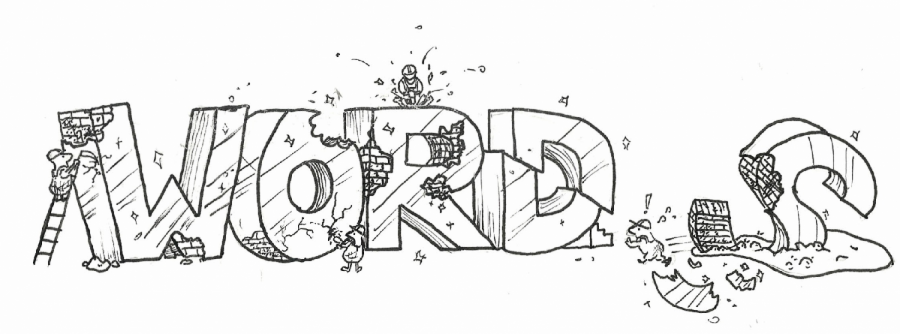A conservation of conversation
October 17, 2018
“Welcome to Medium. A place where words matter.”
The bold black text appears as I open one of the internet’s most popular forums for writing feature articles, and at first, the sentence seems like a normal slogan given the journalistic and literary focus of the website.
But after thinking about the line for a moment, the connotations of the claim seem shocking, yet, sadly, it does not seem wrong when analyzed in the context of the current state of the country.
Fueling this sentiment is the idea that words are being devalued in our society. The power of words – building blocks of language, a medium of communication for referencing a common understanding about the world – lies in their ability to convey ideas in a meaningful fashion, which is now fading away.
Two prime manifestations of a devaluation of words come straight from the highest offices in the U.S.
On July 16, at a NATO summit in Helsinki, President Trump stated, “I don’t see any reason why it would be [Russia],” regarding Russian meddling in the 2016 U.S. election.
But the following day, he made a new statement to reporters: “In a key sentence in my remark, I said the word ‘would’ instead of ‘wouldn’t’… Sort of a double negative.”
The Supreme Court hearings for Brett Kavanaugh were undoubtedly a second example of this trend. Regardless of the issue of whether Kavanaugh, who was confirmed to the Senate in a 50-48 vote last Saturday, deserves his position on the Supreme Court, much of his responses in his testimony did not valuably pertain to the questions asked of him.
The possibility of many of Kavanaugh’s statements later being found to be lies is certainly nonzero: the conversation around his drinking habits is just one example. Some of Kavanaugh’s classmates, including Yale classmates Liz Swisher and Chad Ludington, have come out against their classmate declaring that he was not sharing the truth in his denial of having passed out from drinking or done so excessively in his high school and college years. When questioned by Sen. Sheldon Whitehouse regarding the meaning of a term for vomiting in Kavanaugh’s yearbook, his response included an evasive attempt that was a dialogue about ketchup on spaghetti, and then, “I like beer. I don’t know if you do – do you like beer, Senator? What do you like to drink? Senator, what do you like to drink?”
In the domain of the public, this trend manifests itself in social media. The rise of platforms starting with Facebook, Twitter, and more recently Instagram and Snapchat, has brought fundamental changes in the ways we communicate amongst one another, allowing for a rapid spread of ideas and instantaneous messaging.
With this power available at the fingertips of a vast base of users, the ease of outputting messages can make it tempting to throw around words without thinking first about possible consequences. On top of this is the recent growth of internet “trolling” or the deliberate attempt to cause harm or misunderstanding via online communication. Trolling may be funny when limited in impact or done in channels whose purpose is lighthearted joking, but when applied in a broader scope, it can beget disastrous results and contention.
It would be impractical to urge that all conversations must be deep and thoughtfully conveyed, which would be a radical commitment to an unfavorable ultimatum. But there is a time and place for these things, and it is important to draw a line, explicitly when needed, between the casual and the serious. Most dialogue would indeed benefit from having words of more significance, used deliberately rather than whimsically.
This piece was originally published in the pages of The Winged Post on Oct. 17, 2018.


















![“[Building nerf blasters] became this outlet of creativity for me that hasn't been matched by anything else. The process [of] making a build complete to your desire is such a painstakingly difficult process, but I've had to learn from [the skills needed from] soldering to proper painting. There's so many different options for everything, if you think about it, it exists. The best part is [that] if it doesn't exist, you can build it yourself," Ishaan Parate said.](https://harkeraquila.com/wp-content/uploads/2022/08/DSC_8149-900x604.jpg)




![“When I came into high school, I was ready to be a follower. But DECA was a game changer for me. It helped me overcome my fear of public speaking, and it's played such a major role in who I've become today. To be able to successfully lead a chapter of 150 students, an officer team and be one of the upperclassmen I once really admired is something I'm [really] proud of,” Anvitha Tummala ('21) said.](https://harkeraquila.com/wp-content/uploads/2021/07/Screen-Shot-2021-07-25-at-9.50.05-AM-900x594.png)







![“I think getting up in the morning and having a sense of purpose [is exciting]. I think without a certain amount of drive, life is kind of obsolete and mundane, and I think having that every single day is what makes each day unique and kind of makes life exciting,” Neymika Jain (12) said.](https://harkeraquila.com/wp-content/uploads/2017/06/Screen-Shot-2017-06-03-at-4.54.16-PM.png)








![“My slogan is ‘slow feet, don’t eat, and I’m hungry.’ You need to run fast to get where you are–you aren't going to get those championships if you aren't fast,” Angel Cervantes (12) said. “I want to do well in school on my tests and in track and win championships for my team. I live by that, [and] I can do that anywhere: in the classroom or on the field.”](https://harkeraquila.com/wp-content/uploads/2018/06/DSC5146-900x601.jpg)
![“[Volleyball has] taught me how to fall correctly, and another thing it taught is that you don’t have to be the best at something to be good at it. If you just hit the ball in a smart way, then it still scores points and you’re good at it. You could be a background player and still make a much bigger impact on the team than you would think,” Anya Gert (’20) said.](https://harkeraquila.com/wp-content/uploads/2020/06/AnnaGert_JinTuan_HoHPhotoEdited-600x900.jpeg)

![“I'm not nearly there yet, but [my confidence has] definitely been getting better since I was pretty shy and timid coming into Harker my freshman year. I know that there's a lot of people that are really confident in what they do, and I really admire them. Everyone's so driven and that has really pushed me to kind of try to find my own place in high school and be more confident,” Alyssa Huang (’20) said.](https://harkeraquila.com/wp-content/uploads/2020/06/AlyssaHuang_EmilyChen_HoHPhoto-900x749.jpeg)













